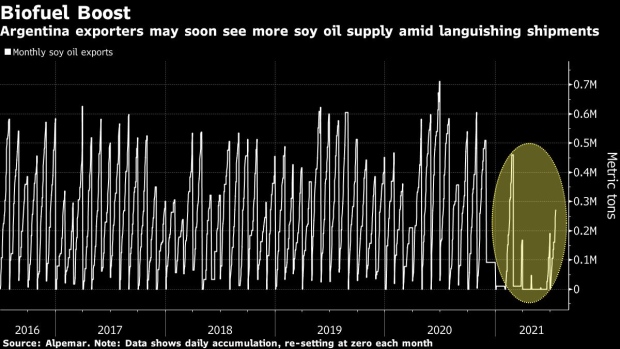Jul 21, 2021
Soy Oil Traders Jostle to Decipher Argentine Export Potential
, Bloomberg News

(Bloomberg) -- Traders dealing in vegetable oil are scurrying to get a read on expectations that the world’s biggest supplier of soybean oil could ramp up exports by almost 10%.
Argentina’s biofuels industry anticipates an additional 500,000 metric tons of soy oil being freed up for export after the South American nation approved a new law last week that cut the blend mandate in diesel fuel in half. That could impact the global market and Argentina, which shipped 5.36 million tons of the soybean extract last year:
- The shift could lead to lower soy oil prices, according to Terry Reilly, senior commodities analyst at Futures International LLC in Chicago. Contracts for December delivery are already down about 4% this week. Lower prices would benefit India, Argentina’s biggest customer
- There’ll now be fewer concerns about global vegetable oil shortages as a drought cripples Canada’s canola crop and food demand increases, said John Baize, an independent analyst who advises the U.S. Soybean Export Council
- The move will increase Argentina’s soy oil exports by about 8% annually, predicts Rich Nelson, chief strategist at Allendale Inc. in Illinois. “Combined with expectations for increased palm oil next year, it will add to the perception of lower prices in 2022,” Nelson said in an email, adding that he doesn’t see a near-term impact on U.S. pricing
There’s one caveat: Argentina hasn’t complied with the old 10% biodiesel mandate in the last 18 months, according to Claudio Molina, head of the Argentine Association of Biofuels and Hydrogen. Blending has averaged out at 4% as manufacturers struggle to be profitable amid a commodities rally and high inflation. The government also temporarily cut the mandate in the first quarter to ease pressure on fuel prices.
“In essence, the new law only ratifies what was already occurring,” Molina said. “So we aren’t going to see an additional 500,000 tons of soy oil for export. That would have already happened last year.”
Dirty Diesel
The blending reduction violates climate goals by making diesel dirtier, according to Molina, though Argentina’s Production Minister Matias Kulfas told reporters on Tuesday that the decision was taken in tandem with other moves to put the country on a track to cleaner energies. With Argentina desperate for export dollars to help its economy, it’s also preferable to ship soy products rather than keep them at home as fuel ingredients, he said.
“If you look at the world, the big bets for sustainable mobility are on hydrogen, lithium batteries and zero-emission power plant cycles,” Kulfas said. “I don’t see biofuels at the vanguard of the international agenda for clean fuels.”
©2021 Bloomberg L.P.


